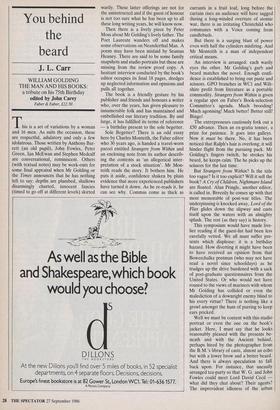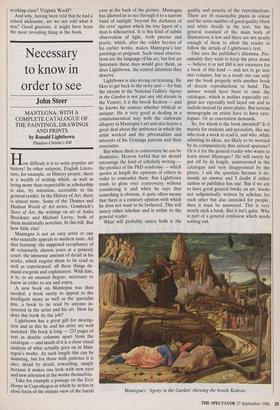You behind the beard
J. L. Carr
WILLIAM GOLDING THE MAN AND HIS BOOKS: a tribute on his 75th Birthday edited by John Carey
Faber & Faber, £12.50
This is a set of variations by a woman and 16 men. As suits the occasion, these are respectful, adulatory and only a few idolatrous. Those written by Anthony Bar- rett (an old pupil), John Fowles, Peter Green, Ian McEwan and Stephen Medcalf are conversational, reminiscent. Others (with textual notes) may be work-outs for some final appraisal when Mr Golding or the Times announces that he has nothing left to say: depths are plumbed, shallows disarmingly charted, innocent fancies (timed to go off at different levels) skirted warily. These latter offerings are not for the uninstructed and if the guest of honour is not too sure what he has been up to all these long writing years, he will know now.
Then there is a lively piece by Peter Moss about Mr Golding's lively father. The Poet Laureate wanders off and makes some observations on Neanderthal Man. A poem may have been mislaid by Seamus Heaney. There are said to be some family snapshots and studio portraits but these are missing from the review proof copy. A hesitant interview conducted by the book's editor occupies its final 18 pages, dredges up neglected information and opinions and pulls all together.
The book is a friendly gesture by his publisher and friends and honours a writer who, over the years, has given pleasure to innumerable folk and has maintained and embellished our literary tradition. By and large, it has fulfilled its terms of reference — a birthday present to the sole begetter.
Sole Begetter? There is an odd essay here by Charles Monteith, the Faber editor who 30 years ago, is handed a travel-worn parcel entitled Strangers from Within and an enclosing note from its author describ- ing the contents as 'an allegorical inter- pretation of a stock situation'. Mr Mon- teith reads the story. It bothers him. He puts it aside, confidence shaken by plain evidence that more experienced publishers have turned it down. As he re-reads it, he can see why. Commas come as thick as currants in a fruit loaf, long before the curtain rises an audience will have sagged during a long-winded overture of atomic war, there is an irritating Christchild who communes with a Voice coming from candlebuds.
But there is a surging blast of power even with half the cylinders misfiring. And Mr Monteith is a man of independent critical means.
An interview is arranged: each warily eyes the other. Mr Golding's garb and beard matches the novel. Enough confi- dence is established to bring out paste and scissors. --GPO branches in WC1 and Wilt- shire profit from literature as a portable commodity. Strangers from Within is given a regular spot on Faber's Book-selection Committee's agenda. Much brooding! Much agonising! Much better! Better still! Bingo!
The entrepreneurs cautiously fork out a £50 advance. Then an ex-gratia tenner, a prize for patience. It goes into galleys. Now it must be there. No, it has been noticed that Ralph's hair is overlong; it will hinder flight from the pursuing pack. Mr Golding's fingers twitch, he strokes his beard, he keeps calm. The he picks up the scissors for the last time.
But Strangers from Within? Is the title too vague? Is it too explicit? Will it sell the book? A Cry of Children, Nightmare Island are floated. Alan Pringle, another editor, is called in. Breezily he comes up with that most memorable of post-war titles. The underpinning is knocked away, Lord of the Flies glides down the slipway and casts itself upon the waters with an almighty splash. The rest (as they say) is history.
This symposium would have made live- lier reading if the guest-list had been less carefully vetted. We all must suffer pre- sents which displease: it is a birthday hazard. How diverting it might have been to have received an opinion from that Bowerchalke postman (who may not have read a novel since schooldays) as he trudges up the drive burdened with a sack of post-graduate questionnaires from the United States. Or who would not have roused to the views of mariners with whom Mr Golding has collided or even the malediction of a downright enemy blind to his every virtue? There is nothing like a growl amongst the hum of purring to keep ears pricked.
Well we must be content with this studio portrait or even the one on the book's jacket. Here, I must say that he looks reasonably pleased with the presents be- neath and with the Ancient behind, perhaps hired by the photographer from the B.M.'s library of casts, almost an echo but with a lower brow and a better beard. And there is always speculation to fall back upon. For instance, that uneasily arranged tea-party so that W. G. and John Fowles could meet Lord David Cecil — what did they chat about? Their agents? The improvident idleness of the urban working-class? Virginia Woolf?
And why, having been told that he had a school nickname, are we not told what it was? Good gracious, it might have been the most revealing thing in the book.



























































 Previous page
Previous page